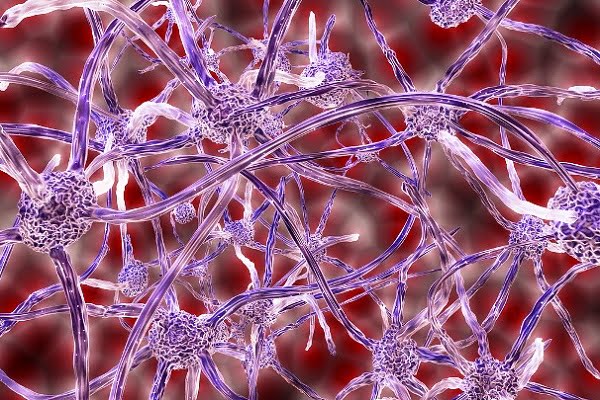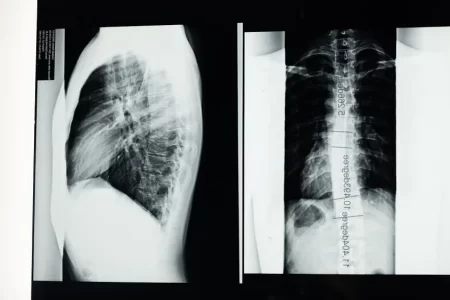Pinched Nerve or Compressed Nerve in Back
- Updated on: Jul 13, 2024
- 7 min Read
- Published on Apr 21, 2021


What are the nerves?
Nerves branch out from the brain and spinal cord in our nervous system to carry instructions to every part of the body. The nerves act like electrical wires that carry signals from the brain to the spinal cord and to the organs.
Nerves within the brain and spinal cord are part of our central nervous system. Nerves that extend from the spine to other areas of the body are called peripheral nerves. These peripheral nerves originate as nerve roots. They exit the spinal cord and then branch off to extend throughout our body. These nerves allow various bodily functions to happen. For example, the nerves that travel to muscles allow the muscles to move and nerves that travel to the skin provide it an ability to feel.
What is a pinched nerve in back (compressed nerve in lower back)?
A pinched nerve is a nerve under pressure that is a compressed nerve. Often, this pressure is exerted by the surrounding bones or tissues. If the nerve compressed enough that it loses its ability to carry its function (transmit signals properly), it can cause a variety of symptoms in the body. For example, when a nerve is pinched or compressed, it can trigger the nerve to falsely experience pain. The pressure can also reduce ability of a nerve to control the muscles it runs through.
One of the most common places for a pinched nerve to occur is within the spine that is back. This is called compressed nerve in the back or pinching of the nerve in back. Our spinal column is surrounded with nerve roots that innervate areas throughout the body and help control various movements and sensations. These nerve roots are particularly susceptible to being compressed by the surrounding tissues and bones particularly because these nerves are contained within a tightly packed spinal canal.
Often the term “pinched nerve” is used to address the uncomfortable sensation, pain, or numbness caused when increased pressure leads to discomfort or damage to a peripheral nerve.
Although this condition is mostly associated with back pain or a neck injury, but any nerve is susceptible to compression.
See also: Sciatica Pain: Causes, Symptoms, Risk Factors, Diagnosis, Prevention, and Treatment
See also: Sciatica Pain Relief: What to do for sciatica back and leg pain?
Early signs and symptoms of a pinched nerve in back (pinched nerve in lower back)
The most common symptom of a pinched nerve in back is a tingling sensation. This feeling can occur along with some numbness. It may initially come and go, but over time can become persistent. Other signs and symptoms of pinched nerve in back are:
- If you have a pinched nerve (nerve compression) your body may send warning signals such as pain. You should not ignore these warning signs. Pain may accompany the tingling sensation. People often describe it as being “sharp” or “electrical.”
- Some patients experience a burning sensation in the back
- Muscle weakness may also occur because the nerve that controls the muscle in back are irritated or damaged
- Tingling, pins and needles sensations (called paresthesia)
- The problems due to a pinched nerve may worsen when you’re sleeping or lying for a long time.
- Shooting pain particularly through the leg or foot if the pinched nerve is located in the lower back
- Muscle spasms in the back (back spasms) commonly occur in pinched nerves and can be quite painful
If the nerve compression lasts a long time, a protective barrier around the nerve may break down. This may cause the fluid to build up. This can cause such as:
- Extra pressure on the nerve
- Scarring
- Inflammation around the nerve
The damage caused by the pinched nerve may be minor or severe. Depending on the severity of the damage, a pinched nerve may cause temporary or long-lasting problems.
When to see a doctor?
It is better to get a diagnosis and treatment for the nerve compression earlier. The earlier you treat it, the more quickly you’ll find relief. You should not ignore the initial pain and sensations due to pinched nerve. Contact your doctor if the signs and symptoms of a pinched nerve last for a few days and don’t respond to self-care, such as rest and over-the-counter pain medicines.
Risk factors for pinched nerve in the back (pinched nerve in upper back, pinched nerve in lower back)
These factors may increase your risk of getting a pinched nerve in the back. It can affect your lower back or upper back based on the actual cause of the problem:
Gender: Women are more likely to develop pinched nerve particularly carpal tunnel syndrome. This may be due to their smaller carpal tunnels.
Bone spurs: Trauma or other conditions that causes bone thickening or bone damage, such as osteoarthritis, can cause bone spurs to develop. Bone spurs can decrease the space where your nerves travel, thereby pinching the nearby nerves. Depending on where the bone spurs develop, you can develop pinched nerve symptoms in lower back or upper back regions.
Thyroid disease: People who have a thyroid disease are at higher risk of carpal tunnel syndrome.
Diabetes: People who have diabetes are more susceptible to experience nerve pinching.
Other risk factors for pinched nerve in back are:
- Overuse of joints such as during labor intensive tasks or with repetitive tasks
- Obesity
- Long periods of lying down such as during traveling or sleeping on the back
- Pregnancy
Causes of a pinched nerve (compressed nerve) in back: Is my back pain caused by a pinched nerve in lower back?
A pinched nerve can occur in the back when too much pressure (compression) is applied to a nerve by surrounding tissues in the back.
This tissue that exerts pressure might be bone or cartilage, such as in the case of a herniated spinal disk that compresses a nerve root in the vertebral column causing sharp back pain. In some cases, muscle or tendons or soft tissues may expert the pressure causing compression of the nerve in your back, which can cause the condition.
There can be a variety of causes for compression of a nerve in the back. Some of the most common of them are:
- Trauma and/or accident
- Holding the body in one position for a long period of time such as while travelling
- Spinal arthritis: It is quite a common condition that occurs when cartilage in the joints becomes worn out due to aging, wear and tear. Inflammation can also occur in this condition. This puts extra pressure onto nearby nerves in the back causing pinched nerve. Read about osteoarthritis.
- Bone spurs: Small-sized sharp outgrowths of bone can develop along the spine along with inflammation that causes cells to deposit extra bone in the region. This can occur at different locations including the spine (back region). These spurs are called osteophytes.
- Herniated disc(s): Herniated disc is a common cause of pinched nerve. It can be quite painful. It occurs when a tear or weakness in a vertebral disc’s outer layer allows the gel-like inner layer to leak into the spinal canal. This places extra pressure on the nerves in the area causing pain and severe problems.
- Sciatica: The sciatic nerve, when gets compressed, can cause pain through the lower back and into the leg. This condition is known as sciatica. It is commonly due to a pinched nerve in lower back.
- Sports, exercise, or improper lifting or other labor work involving heavy use of the back.
- Our spine is a sophisticated structure. It is highly susceptible to injury and general wear and tear. If any damage or changes occur to the components of our spine such as in its discs or bones or tendons, it can quickly irritate or pinch a nearby nerve, which can be extremely painful.
See also: What are the various symptoms and complications of osteoarthritis?
See also: What is osteoarthritis?
Diagnosis: How is a pinched nerve in the back diagnosed?
Your doctor will likely make the diagnosis of pinched nerve by collecting history of the symptoms and performing a physical examination. Based on the initial evaluation, he or she might order some tests for further testing as required.
One of the tests that is often used by doctors for the diagnosis of a pinched nerve is electromyography (EMG). It is a nerve conduction study to confirm the diagnosis of a pinched nerve and to determine the extent of nerve damage, if there is any.
Sometimes, MRI or a CT scan or an X ray can be done if the pinched nerve is in the neck (cervical spine) or back (lumbar spine) to perform the diagnosis of the pinched nerve. These tests can also help understand and identify the cause of the pinched nerve such as a bulging disc, arthritis, or fracture etc.
Treatment for a pinched nerve in back: Pinched nerve remedy
The treatment of a pinched nerve in back depends upon the cause of the compression. In many cases, mere resting the affected area is quite helpful and can cure the problem, particularly when the pain and compression is due to an injury caused by repetitive activities such as sports or exercises.
Physical therapy is also recommended when a pinched nerve is caused by problems in the neck or low back. It is considered an effective pinched nerve therapy.
Exercises may help you build strength in the back or muscles and decrease or eliminate the pressure on a nerve root in the back.
Other possible options for treating a pinched nerve in the back are:
- Alternating between hot and cold therapy at home can be effective
- Therapeutic massage by a therapist can increase blood flow and induce relaxation
- Acupuncture involves the use of specialized needles on specific trigger points within muscles. It is frequently used as a treatment for compressed or pinched nerves.
- Over-the-counter and prescription anti-inflammatory medications such as ibuprofen may be helpful
- Injections of corticosteroids (an anti-inflammatory medication) is also sometimes recommended for many types of pinched nerves in the back and neck
- Surgery may be needed to release pressure on the nerve if medication or other therapies do not help. The specific type of surgery depends upon the nerve involved and the location of the compression. The goal of the surgery is to relieve the pressure on the affected nerve and ease the symptoms such as pain.
Prevention of a pinched nerve: Can you prevent a pinched nerve in the back?
There are certain ways you can try to help prevent the condition. These nerve compression prevention tips are:
- Pay attention to your body positions
- Maintain good posture and do not lean on elbows.
- Avoid crossing the legs too frequently while sitting
- Decrease repetitive activities as these can cause a pinched nerve.
- If repetitive activities are necessary to perform a task, try to take frequent breaks in between them as these can reduce the risk of nerve compression.
- Do strength and flexibility exercises
- Maintain a healthy weight as obesity is a risk factor for pinched nerve
- Don’t lie in one position for a long time











